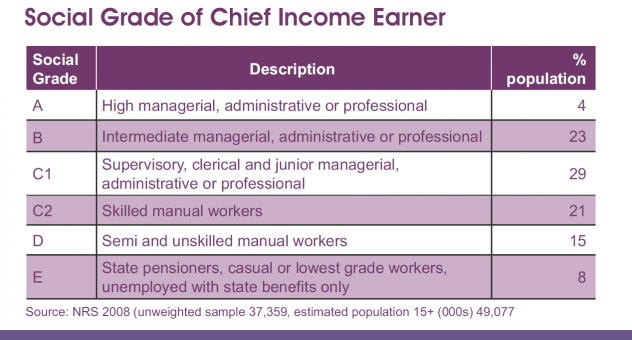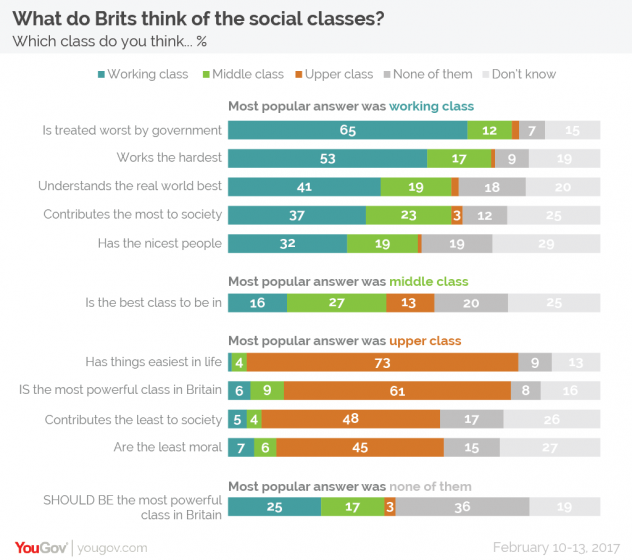Inequalities and Political Engagement
I’ve long since accepted that I’ll never come close to being a politician, even if I wanted to, I wasn’t born into the right family or social class, didn’t go to the right school or university (nowadays it’s a bit foolish to believe the meritocracy really is a viable way of making it in politics). And the same can be said for many Brits riddled with the inequalities thrust upon us by the society we live in.
Despite the fact that the top two social grades count for just 27% of the population, they had the biggest turn out in the 2017 election -at 69%- and what was the most popular vote for? You guessed it, the Tories (Ipsos Mori, 2017).
Figure 1- Social Grade of Chief Income Earner (Ipsos Mori, 2009)
As all elections slogans are, the Conservative party’s slogan for the 2017 election was made and brought forward by politicians coming from a privileged background: “forward, together” … if you can afford it. Of course, it’s inevitable that in a capitalist society class differences will lead to inequalities within the country, but it would be incomplete to say that economic issues are the sole driving force or inequalities, politics plays a huge part itself, after all, the rich and powerful aren’t going to back a policy that could put their comfy lifestyle at risk (Wiseman, 2017).
“Ideology has always been the most powerful weapon” -Wiseman, 2017:355
And so, whilst the grading system (Fig. 1) gives a slight insight into how the population is broken down by occupation, it’s not quite the same as social class, it differs slightly in that social class leans more towards status and power within society (Ipsos Mori, 2009). Here’s a quick insight into the class differences from The Frost Report in the 1966, of course a LOT has changed since then, but I still think it’s pretty relevant:
Video- The Frost Report- I know my place (Temple-Murray, 2016)
“But while I am poor, I am industrious, honest and trustworthy. Had I the inclination, I could look down on them “
A poignant line within the sketch from the working class man; and supported by those who took part in YouGov’s 2017 polls regarding social class. Overall, the working class was thought to work the hardest, contribute the most to society, and have the nicest people, and (surprise) the upper class were voted the least moral (Fig. 1- Smith, 2017). Regardless of this, 65% of those who answered the poll said that the working class is treated the worst by the government- if this is the case, its no wonder the working class has a lower turn out; just 53% of those from social grade DE in the 2017 election, 16% lower than the AB’s (Ipsos Mori, 2017).
Figure 2- What do Brits think of the Social Classes? (Smith, 2017)
It’s pretty reasonable then to wonder why the working class would want to engage in politics if they’re being treated badly by the government. But I’d have to turn the question back round on you, if the working class is being treated badly by the government, shouldn’t that make them want to elicit a change in policy? A crowd of voices is far more powerful than a single voice. After all, the bigger the crowd, the bigger the commotion.
However, I get that it’s not quite as simple as telling people to go out and vote. One of the main reasons why there is a lower turn out in the working classes is due to educational influences. As I said previously, I’ll never become a politician because I didn’t go to the right school or university. Of the 290 cabinet ministers, who were graduates, in the UK between 1937 and 2012, 182 of them studies at Oxbridge, yet I do not even study at a Russel Group university (Feeney, Hogan, O’Rourke, 2017). So my chances of ever being a political party leader are pretty slim.
But the inequalities lie earlier in education than university, Bourdieu and Passeron (1990) argue that education as a whole passes on the ideologies that serve the powerful, in basic terms, the rich use education to encourage children from higher social classes to get involved in politics and learn qualities that will help them reach leadership roles, where as it teaches children from lower classes how to work and respect a hierarchy. Right from the start it’s a game of predestination as to who are more likely to become world leaders; political learning is directly influenced by social class, students from higher classes feel more confident in expressing their views in the classroom (Hoskins, Janmaat, Melis, 2017). Whilst we can’t control that as a single person, we can encourage political conversations in the home, and perhaps we could start to encourage the next generation to engage more often.
So while I see how put off working class people may be, it may be easier to ‘know your place’ or accept that the government is never going to treat you how you’d like, that’s still no reason not to engage. Question that policy, learn about what’s going on and talk to your children about it. Have your voice heard, don’t let the upper class drown you out.
Bibliography:
Bennett, A. (2015) Which part had the most career politicians standing for election- and how many have had a ‘real job’? Telegraph [Online] Available at: https://www.telegraph.co.uk/news/general-election-2015/politics-blog/11498660/Revealed-how-many-General-Election-candidates-have-had-real-jobs-and-how-many-are-professional-politicians.html
Bourdieu, P., Passeron, J. (1990). Theory, culture & society. Reproduction in education, society and culture, 2nd ed. Thousand Oaks, CA, US: Sage Publications
Feeney, S., Hogan, J., O’Rourke, B. (2017) Just how elitist are the higher education backgrounds of our political leaders? [Blog] British Politics and Policy. Available at: http://blogs.lse.ac.uk/politicsandpolicy/how-elitist-are-the-higher-education-backgrounds-of-uk-political-leaders/
Hoskins, B., Janmaat, J.G. and Melis, G. (2017) Tackling inequalities in political socialisation: A Systematic analysis of Access to and Mitigation Effects of Learning Citizenship at School. Social Science Research. [Online] 68 pp. 88-101. Available at: https://www.sciencedirect.com/science/article/pii/S0049089X16304458?via%3Dihub
Ipsos Mori (2009) Social Grade [Online] Available at: https://www.ipsos.com/ipsos-mori/en-uk/social-grade
Ipsos Mori (2017) How Britain Voted in the 2017 Election [Online] Available at: https://www.ipsos.com/ipsos-mori/en-uk/how-britain-voted-2017-election
Smith, M. (2017) What do Brits think of the social classes? YouGov [online] Available at: https://yougov.co.uk/news/2017/09/26/what-do-brits-think-social-classes/
Temple-Murray, C. (2016) The Frost Report- I Know My Place. [Video] Available at: https://www.youtube.com/watch?v=nxpZkKKbDgA
Wiseman, J. (2017) Politics, Not Economics, Ultimately Drives Inequality. Challenge. [Online] 60(4) pp. 347-368. Available at: https://content.ebscohost.com/ContentServer.asp?EbscoContent=dGJyMNLr40SeprQ4y9fwOLCmr1Cep7FSr6a4TbGWxWXS&ContentCustomer=dGJyMPGus0i1rK9JuePfgeyx43zx1d%2BI5wAA&T=P&P=AN&S=R&D=buh&K=124091111

